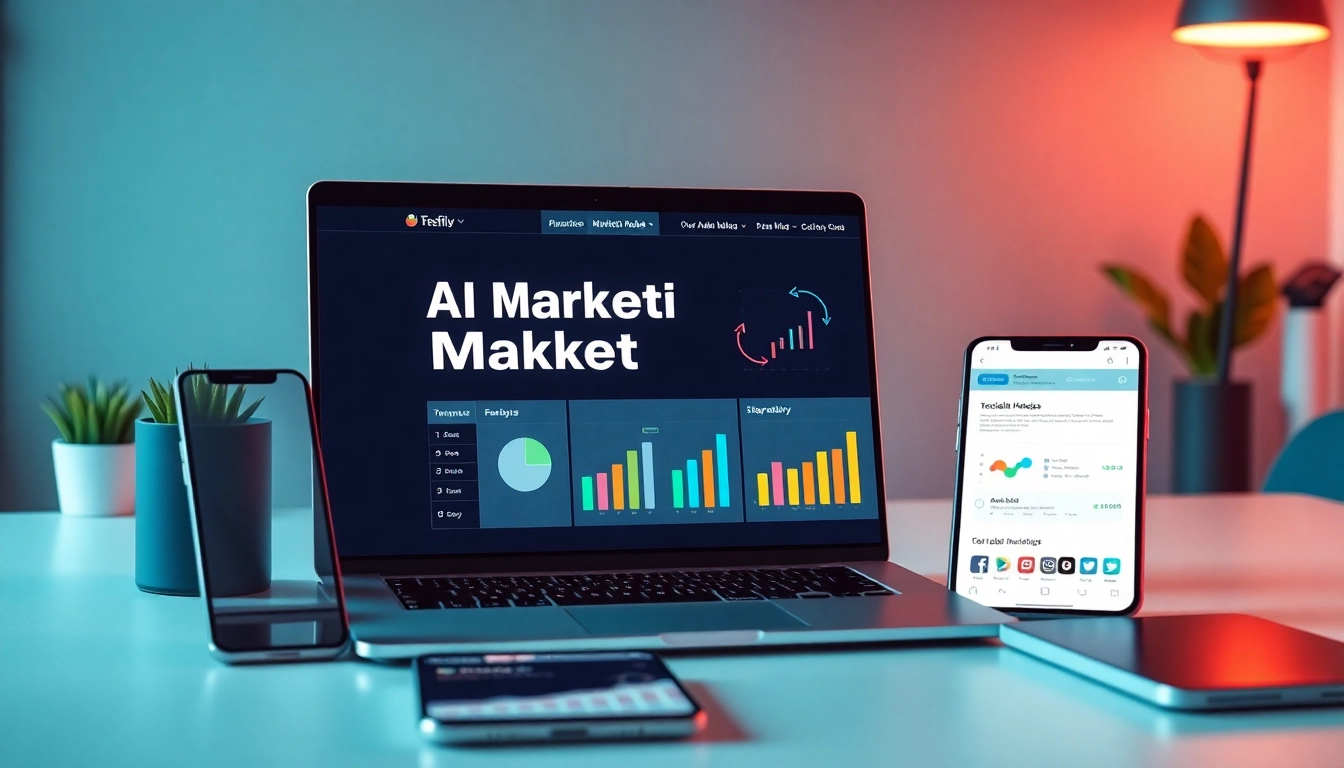Understanding AI Marketing Tools
In the ever-evolving landscape of digital marketing, businesses are continually seeking innovative ways to streamline their processes and enhance customer engagement. One powerful solution that has emerged is the use of AI marketing tools. These tools leverage artificial intelligence to facilitate a wide range of marketing activities, from enhancing customer interactions to automating time-consuming tasks. In this article, we will explore what AI marketing tools are, their key features and benefits, the different types available, how to choose the right tools for your business, effective implementation strategies, and the future trends shaping the market.
What Are AI Marketing Tools?
AI marketing tools are software applications that utilize artificial intelligence to assist marketers in optimizing their campaigns, analyzing consumer data, and automating various marketing tasks. These tools are designed to mimic human intelligence in data analysis and decision-making, providing insights that help businesses make more informed marketing decisions. AI tools can be particularly useful in tasks such as customer segmentation, personalized content creation, predictive analytics, and performance tracking.
Key Features to Look For
- Automation Capabilities: Effective AI marketing tools should offer automation features that can handle repetitive tasks such as email marketing, social media posting, and data collection.
- Data Analysis: Look for tools that can analyze large volumes of data quickly to provide insights on customer behavior, trends, and campaign performance.
- Personalization: The ability to create personalized marketing messages and experiences based on consumer data is vital for engagement.
- Integration: Ensure that the tools can integrate seamlessly with existing platforms, such as CRM systems, social media channels, and analytics tools.
- User-Friendly Interface: The effectiveness of a tool greatly depends on how easy it is to use. A simple and intuitive interface can facilitate smoother operations.
Benefits of Using AI in Marketing
Integrating AI into marketing strategies offers numerous advantages, including:
- Improved Efficiency: AI tools automate routine tasks, allowing marketing teams to focus on strategy and creativity.
- Enhanced Customer Insights: Businesses can gain deeper insights into consumer behavior patterns, preferences, and trends, leading to more targeted marketing efforts.
- Increased ROI: By optimizing campaigns based on data-driven insights, companies can achieve higher conversion rates and better returns on investment.
- Scalability: AI tools enable businesses to scale their marketing efforts without a proportional increase in resources, thus maintaining efficiency even as they grow.
Types of AI Marketing Tools
Content Creation and Optimization Tools
Content remains at the heart of effective marketing strategies. AI-driven content creation tools assist marketers in generating high-quality content quickly. These tools utilize natural language processing (NLP) algorithms to create blog posts, social media updates, and even marketing copy based on user input.
- Examples: Tools like Jasper.ai and Copy.ai are popular for generating engaging content that resonates with the target audience.
- Benefits: By streamlining the content creation process, these tools allow marketers to maintain a consistent brand voice while saving time on writing.
Analytics and Insights Platforms
Analytics tools powered by AI focus on tracking and analyzing data from various marketing channels. They provide marketers with comprehensive reports that detail campaign performance, customer engagement levels, and sales conversions.
- Examples: Google Analytics and Tableau use advanced algorithms to interpret data and provide actionable insights for improving marketing strategies.
- Benefits: These insights help marketers to identify successful campaigns and areas that require adjustments, resulting in more effective strategies moving forward.
Social Media Automation Solutions
The role of social media in modern marketing is paramount. AI tools streamline social media management by scheduling posts, analyzing engagement data, and optimizing content based on audience preferences.
- Examples: Hootsuite and Buffer provide features for managing multiple social media accounts while delivering performance analytics.
- Benefits: Businesses can save time by automating postings and gaining insights on optimal posting times and effective content types.
How to Choose the Right AI Tool
Assessing Your Business Needs
The first step in selecting AI marketing tools is to evaluate your business’s specific needs. Understanding your marketing goals—such as increasing brand awareness, boosting sales, or enhancing customer loyalty—will guide you in choosing the right tools.
Factors to Consider in Selection
- Budget: Determine how much you’re willing to invest in AI tools. Keep in mind that while some tools may have high upfront costs, their ability to save time and increase revenue can result in better long-term value.
- Features: Ensure the tools you consider have the features necessary to meet your business objectives.
- Scalability: Choose tools that can grow with your business. This could mean selecting tools with flexible pricing or features that allow for expansion.
- Customer Support: Look for vendors that provide robust customer support and educational resources to help you get the most from their tools.
Cost vs. Value Analysis
Every AI tool comes with its own cost, but the key is to evaluate the value it brings against that cost. Consider the potential ROI from using the tool. For instance, automation tools that drastically cut down the time spent on manual tasks can lead to significant savings in operational costs.
Implementation Strategies
Integrating AI Tools into Your Workflow
Once you’ve chosen the right AI tools, integrating them into your existing marketing workflows is crucial. Start by training your team on how to use the tools effectively. Create a structured rollout plan, beginning with a pilot phase where a select group uses the tool and provides feedback.
Online Resources and Training
Taking advantage of online resources is essential for maximizing the capabilities of your chosen tools. Many AI marketing solutions offer webinars, user forums, and tutorials that can enhance your team’s understanding and efficiency.
Measuring Success Post-Implementation
After implementation, it’s vital to measure the success of your AI tools. Track key performance indicators (KPIs) that align with your initial goals. Regularly assess these metrics to determine the effectiveness of the tools and make adjustments as needed.
Future Trends in AI Marketing
Emerging Technologies in Marketing
The marketing landscape is continuously transforming, and staying ahead requires awareness of emerging technologies. Tools that leverage machine learning for personalized marketing, and predictive analytics are becoming increasingly popular.
Predictions for AI’s Role in Marketing
Experts suggest that AI will play an even larger role in personalizing customer experiences. As AI technology evolves, it’s likely that we will see more sophisticated algorithms that can offer real-time customer engagement metrics and insights.
Staying Ahead of Competitors
To maintain a competitive edge, businesses should continually evaluate and adopt new AI marketing tools. Invest in training and development to ensure that your marketing team can leverage these technologies to the fullest.






















+ There are no comments
Add yours